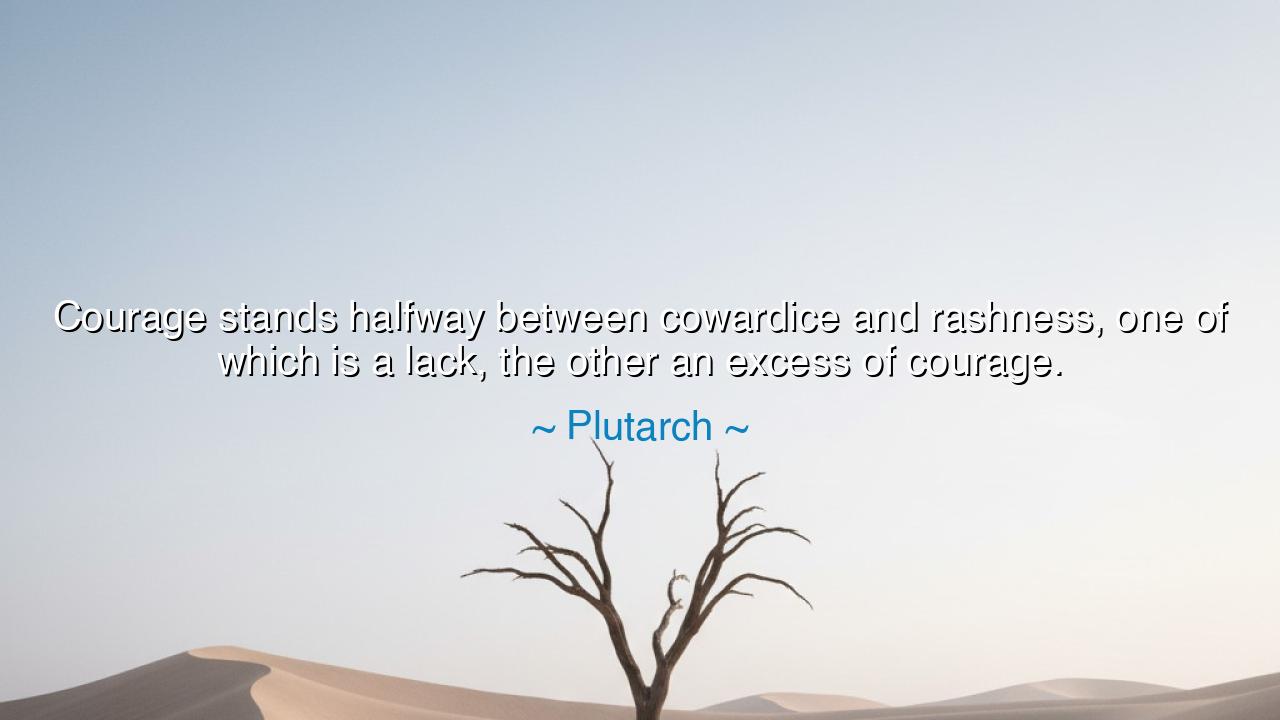
Courage stands halfway between cowardice and rashness, one of
Courage stands halfway between cowardice and rashness, one of which is a lack, the other an excess of courage.






Hear now the timeless wisdom of Plutarch, the philosopher and historian of ancient Greece, who observed the virtues of men and the rise and fall of empires. He said: “Courage stands halfway between cowardice and rashness, one of which is a lack, the other an excess of courage.” In this single sentence lies the golden law of balance—the eternal path that all who seek virtue must walk. For courage, though noble, can turn to folly when uncontrolled, and to weakness when absent. Between fear and recklessness lies the narrow way of true strength: the calm, steady bravery of the soul that neither flees nor rushes blindly into ruin.
Plutarch was not a man of idle words. He lived in the time of warriors and philosophers, when the Greeks revered balance above all things. His wisdom draws from the teachings of Aristotle, who declared that every virtue is a mean between two extremes. Just as temperance lies between indulgence and apathy, so courage lies between cowardice and rashness. The coward, enslaved by fear, abandons his duty before danger. The rash man, drunk on pride, charges into peril without thought. But the truly courageous man, guided by reason, knows when to stand firm and when to withdraw. His strength is not in defiance of fear, but in mastery over it.
In the days of old, Greece bore witness to countless examples of both kinds of men—the fearful and the reckless—and the heroes who found the golden middle path. Consider Leonidas, king of Sparta, who stood with his three hundred at Thermopylae against a sea of foes. He did not seek death for glory’s sake, nor did he retreat in cowardice. His courage was measured, born of duty and wisdom. He knew the odds, yet chose to fight because honor demanded it. In his calm acceptance of sacrifice, we see not rashness, but harmony—the kind of courage Plutarch praised: steadfast, purposeful, and guided by the light of understanding.
Yet history also remembers those who mistook madness for valor. Many have perished through reckless pride, charging ahead without thought of consequence. Achilles, greatest of the Greeks, was both hero and warning. His bravery was unmatched, yet his anger made him blind. In slaying Hector, he won fame; in his unbridled fury, he sealed his own fate. Thus, the ancients taught that courage must be wedded to wisdom, for power without judgment becomes destruction. To act with bravery is noble—but only when the heart is steady, and the mind is clear.
Plutarch’s insight reaches far beyond the battlefield. In the quiet struggles of everyday life, the same law governs the soul. The coward hides from truth, fearing the pain of failure or rejection. The rash man leaps without reflection, mistaking impulse for freedom. But the courageous man faces his challenges with clarity. He speaks when silence would be cowardly, and holds his tongue when words would do harm. He dares to act, yet also dares to wait. This balance—this wisdom of the heart—is the highest form of bravery.
In every age, the world demands such courage. To raise a voice against injustice when others are silent is courage; to act with restraint when anger tempts violence is also courage. It is not always the loud or the dramatic act that defines valor, but the quiet persistence of those who do what is right despite fear or temptation. The wise know that courage is not the absence of fear—it is the art of walking through fear with purpose.
Therefore, O listener, take this teaching as a compass for your life. When fear grips you, do not yield to cowardice; when pride inflames you, do not fall into rashness. Stand instead in the middle, where clarity reigns. Before each action, ask: Is this born of wisdom or of impulse? Is this strength or vanity? In that reflection, you will find the measure of true courage. For courage that is wise endures; courage that is wild destroys.
Let the words of Plutarch echo in your heart: “Courage stands halfway between cowardice and rashness.” Walk this middle path, and you will not only survive the tempests of life—you will master them. For in balance lies virtue, in self-command lies victory, and in the quiet steadiness of true courage lies the soul’s eternal peace.






AAdministratorAdministrator
Welcome, honored guests. Please leave a comment, we will respond soon